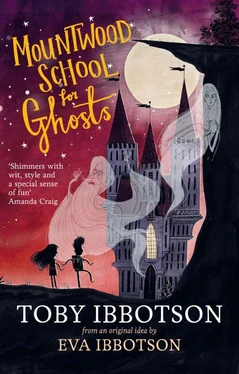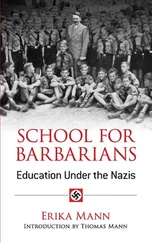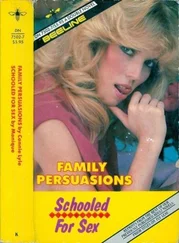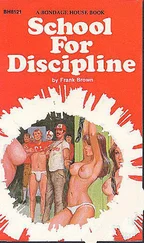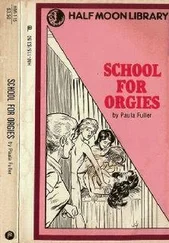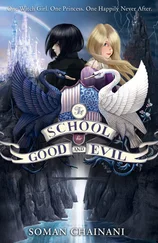Fredegonda marched towards the children, who scrambled to their feet. Daniel found himself smoothing down his hair. Charlotte tried to brush a bit of the dirt off the front of her jeans.
The Great Hagge towered above them, arms akimbo and a fierce glitter in her eye.
‘You are mere chits, sprogs. You are humans. You are no doubt terrified by what you have seen this night.’
‘Well, a bit… frightened,’ said Charlotte. She didn’t want to say that by far the scariest thing in that courtyard was the Great Hagge Fredegonda.
Fredegonda snorted. She turned and in a mighty voice addressed the assembled phantoms.
‘Now, perhaps, you understand. These children, these weak and tiny things, are a bit frightened . They are not petrified, or horror-struck. They have not been driven mad with fear, or died of sheer terror. Their hair has not turned white, they do not even tremble. It is not good enough; it will not do. You have brought shame upon the name of true haunting. You must apply yourselves to your work unceasingly and put this failure behind you. And until then it is absolutely against school rules to have any communication, friendly or otherwise, with members of the human race. Now please disappear. There will be no more lessons tonight.’
Within seconds the courtyard was empty.
Now Fredegonda turned back to Daniel and Charlotte. ‘As for you two, Goneril will run you into the village in the morning.’ She turned away. ‘Come, girls, I am calling an emergency staff meeting.’
The three Great Hagges stumped back into Mountwood, slamming the door behind them.
Daniel and Charlotte stood outside. It was cold, dark and damp.
‘Rotten cow,’ said Charlotte.
‘Our French teacher is a bit like her,’ said Daniel.
Then a voice whispered gently on the night air. ‘I daren’t appear, but I just had to thank you.’
It was Iphigenia. ‘Percy has told me everything and, oh you darlings, I am so, so, grateful. I shall be in your debt until the end of time. If we can ever be of help… I shouldn’t say that, should I…? But I mean it, I do.’
There was a moment of silence, and then, very faintly, they heard, ‘There is straw in the byre.’ And Iphigenia was gone.
Daniel and Charlotte found the byre, an old stone building close by with a half-collapsed roof. Inside it was pitch dark, but they felt their way forward and burrowed into the heap of old straw that lay there. They crept close together for warmth, and fell into an exhausted sleep.
Afterwards Daniel thought that the most surprising part of their whole trip came the next morning, when they rode to the bus stop in the village in the back seat of a 1912 Rolls-Royce Silver Ghost driven by a Great Hagge called Goneril.
Jack Bluffit, head of the city Department of Planning, stood gazing out of his office window. His office was right at the top of the council building, with one wall almost entirely made of glass, so the whole city was spread out below him. His city — that was how he thought of it. He had been born in it, grown up in it and seen it change. Lots of the changes were his work, planned by him, and he was proud of it. People moaned about old buildings and narrow streets being torn down to make way for shiny new tower blocks and big roads and flyovers; they whined about the city losing its ‘character’, or its ‘charm’. Jack despised them. He knew better. He remembered well enough the slum where he was born. He remembered the miners with their sunken chests and the horrid coughs that would kill them. That was charm all right. He remembered his mother going out to scrub, and coming home exhausted with chapped hands, to put a meal of bread and dripping on the table. He remembered the earth closet at the back of the house which always stank. He remembered the kids with rickets and heads that had been shaved by the nit lady at school. That was character, was it?
Jack himself had no children; he had never wanted any. ‘The city is my baby. I’ve given it the best years of my life,’ he used to say, whenever some office worker started boring him to death about how their Sheila had got top marks in history or played ‘Twinkle, Twinkle, Little Star’ on the recorder. Children were just a waste of time and money, in Jack’s view. Snot and nappies and expensive rubbishy toys that got broken the next day. He had more important things to do. He had been determined from the age of seven to make things change, and he had done it. It had been a long hard fight to the top. But now he was there. He was the strong man of the city. The politicians on the council came and went. Here one year, gone the next. Talking and voting. But Jack Bluffit was always there, making plans.
That’s what he was doing now, as he gazed down on his city. From his window he could see the long sweep of the street that led down to the railway station, and halfway along was a great big monument, with a statue of Lord Lilford on it. Carved on the pediment was an inscription that Jack had read a thousand times on his way to the station. ‘Lord Lilford, Benefactor of this City.’ Now Jack saw in his mind’s eye a bronze statue; a statue of a man seated on a powerful rearing horse, the great curve of its neck and the noble head reined effortlessly in by one firm hand. In the other hand, held aloft for all to see, was a roll of paper (bronze paper, of course): the plans for the regeneration of the city. And the proud determined face of the rider was the face of Jack Bluffit. He would have something better than children to remember him when he was gone, he would make sure of that. The city would remember him.
Jack went over to his desk and sat down. He leaned back in his chair and clasped his hands behind his head. The chair creaked and complained. Jack was no lightweight. He had thick hairy arms, a thick neck and a solid square head. He had a big round stomach which strained his shirt buttons, and big round thighs. He looked like the kind of person you might meet working on an offshore oil rig or a construction site. Sometimes people made the mistake of thinking that a thick body went with a thick head. But they usually regretted it. Jack could never have got where he was if he had been stupid. He was wily. Nothing got built or pulled down in the city without Jack Bluffit’s say-so. He always got what he wanted, and he did not much care how. As far as Jack Bluffit was concerned, rules and regulations were only there to keep the little people in their place, and if they were stupid enough to let that happen, well, hard luck for them. When he narrowed his sharp little eyes and pursed his thick lips and started to work out ways of getting what he wanted, there were not many council workers or politicians who could stand in his way, and now there was something that Jack wanted very badly.
There were some unopened letters on his desk, and Jack started to look through them. Most of them were official business, but one was a card with stylish writing on it. ‘Lord Ridget has the pleasure of inviting you to join the hunt at Ridget Hall on Sunday the 23rd…’
Jack Bluffit snorted. That snob Ridget would never have had him within fifty miles of Ridget Hall if he could help it. But Jack knew what he was after. Jack had plans that made Lord Ridget tremble in his posh shoes. If Ridget thought that he could twist his arm by impressing him with his snooty county friends, he had another think coming. But then something struck Jack. He would have to pose for the statue, and he had to look natural. He didn’t want people snickering when it was unveiled and saying that he had never sat on a horse in his life. A bit of practice would come in handy. And it couldn’t be that difficult. If that gangling chinless wonder Ridget could ride, then anybody could. He took a sheet of paper out of the desk drawer and wrote a reply.
Читать дальше
